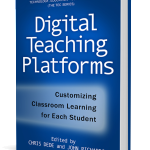Student Failure as a Learning Tool
Much is now being debated about the new Common Core assessment standards. In a recent School Librarian Journal article by Paige Jaeger (The Wrong Villain: Critics Should Focus on Race to the Top not on Common Core 1/20/2014) Jaeger pointed out that critics of the common core initiative should instead be focusing the Race to the Top $4.35 billion competitive grant program sponsored by the U.S. Department of Education “to reform schools, with a focus on measuring student success and holding teachers and principals accountable as a strategy to close the achievement gap, and reforming curriculum.” 
She goes on to state that “The RttT has driven the ills of excessive testing; teacher measurement; data-archiving monsters that will track “achievement” by numbers using many days annually in formal assessment; and requiring monetary expenditures on electronic devices or computers. This is what should be questioned.” She wants to know if we need a $350 million “national testing behemoth” to administer the Common Core.
First of all what Jaeger seemingly fails to understand is that the new computerized test are being designed to test the more rigorous common core curriculums that are now being developed. The computerization of tests in itself technologically advances students to be better prepared to compete and thrive in a global economy.
Should standardized tests be the only measure of student achievement? Absolutely not.
In a recent PD article by Thomas Friedman (“How to get a Job at Google” – 2/25/2014), Google’s Laszlo Bock, the guy in charge of hiring for one of the world’s most successful companies — noted that Google had determined that “GPAs are worthless as a criteria for hiring, and test scores are worthless. . . . We found that they don’t predict anything.” However he continues “Good grades certainly don’t hurt. Many jobs at Google require math, computing and coding skills, so if your good grades truly reflect skills that you can apply, it would be an advantage.”
In the real world we still need ways to measure the knowledge level of people and standardize testing is an efficient way of doing this especially in math and the sciences. Other subjects not so much. Essays in English, history and social studies could suffice but it would be a lot of evaluation work for teachers and since the essay evaluation would boarder on the subjective the grading would be open to criticism.
One thing I think has to change is the stigma related to student failure. This is one of the reasons why many of the assessments of No Child Left behind were dumbed down. As a result students do not understand the positive virtues of failure and with new test score predicted to fall an average of 30 percent failure could commonplace.
In Paul Gullixson’s recent article(“Finding Team Players in iPod Age,” Santa Rosa Press Democrat – 2/23/2014), one of the panelist at the Economic Outlook Conference, oDesk’s VP Matt Cooper, said that “What I see are more graduates coming out who have never had to struggle. In an age of helicopter parents, some emerge without having learned the art of failing, a fundamental component in what gives the Bay Area its economic edge on the rest of the world — innovation.”
 One of several progressive teaching and learning platforms being developed to implement the new standards is “Innovation-based Learning” in which students are actually given test that are rigorous to a point that students are certain to fail the first time they are tested. Students then use the test as learning tools and are also taught that current failure can lead to later success. In another progressive platform, “Blended-based Learning,” students watch the teacher’s lesson lecture on a video at home and the next day spend their entire class time testing and discussing the test results and in “Project-based Learning” failure analysis is part of the program.
One of several progressive teaching and learning platforms being developed to implement the new standards is “Innovation-based Learning” in which students are actually given test that are rigorous to a point that students are certain to fail the first time they are tested. Students then use the test as learning tools and are also taught that current failure can lead to later success. In another progressive platform, “Blended-based Learning,” students watch the teacher’s lesson lecture on a video at home and the next day spend their entire class time testing and discussing the test results and in “Project-based Learning” failure analysis is part of the program.
So it would be nice to save the $350 million that is being used to develop the new assessments but the new tests are needed as much as the new ideology of the Common Core itself. You wouldn’t put old tires on a new care and who knows, all this progressive education may produce a generation of innovation the world has never seen or at least a generation that knows how to see things through.

Recent Comments